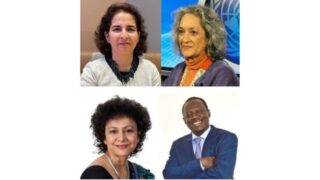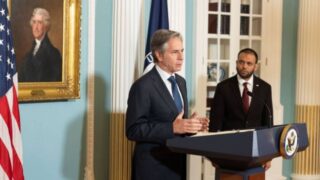The campaign by the International Federation for Victory Over Communism, founded by Reverend Moon, against foreign spies in Japan was a main reason leading to left-wing slander.
by Toshikazu Masubuchi
Article 2 of 3. Read article 1.


Despite being a liberal democracy, Japan became known as a “spy haven” due to the absence of espionage prevention laws.
In 1982, Lieutenant Stanislav Levchenko, a former KGB operative engaged in espionage activities in Japan, defected to the United States and testified before the U.S. House Intelligence Committee in July. Levchenko testified that Japan’s lack of laws prohibiting espionage made his work easy and revealed the names of approximately 200 politicians and journalists who collaborated with espionage activities in Japan, including prominent members of the Japan Socialist Party such as Seiichi Katsumata (former chairman), Shigeru Ito (chairman of the Policy Deliberation Council), and Tamotsu Sato (secretariat chief of the Socialist Association). This revelation was a significant event.
While North Korean agents were also active in Japan, the absence of espionage prevention laws hindered the police from taking any effective measures. If there had been spy prevention laws, incidents of North Korea abducting Japanese citizens could have been prevented. Japan, being an advanced country industrially, also needed to protect its industries from industrial espionage.
Due to these national security concerns, IFVOC, the International Federation for Victory Over Communism founded by Reverend Sun Myung Moon, sought support from experts in various fields such as politicians, businessmen, scholars, journalists, legal professionals, diplomats, religious figures, and citizens with security experience, for the establishment of the “Spy Prevention Law Enactment Citizen Conference.” Local organizations were set up in all prefectures to carry out awareness campaigns for the enactment of such a law. In February 1979, the “Spy Prevention Law Enactment Promotion Citizen Conference” was formed. Its chairman was Seiichi Uno, a professor emeritus at the University of Tokyo. A founding member meeting was held at Sankei Hall (Tokyo), attended by 300 scholars, intellectuals, and businessmen.
In April 1984, a general meeting was held at the National Diet Building, where approximately 300 lawmakers and experts gathered for the establishment of the “Parliamentarians and Experts Discussion Group for the Promotion of the Spy Prevention Law.” The chairman was Nobusuke Kishi, former Prime Minister.
I also made efforts to promote the adoption of an “Opinion Statement Calling for the Enactment of the Spy Prevention Law” in the Tochigi Prefectural Assembly on March 25, 1982. A Socialist Party assembly member vehemently opposed it, attempting to resort to obstructive tactics, but after a prolonged struggle until midnight, the opinion statement was finally adopted. As the secretary-general of IFVOC’s Tochigi Prefecture General Branch, I traveled across the prefecture giving speeches at various events.
Law enforcement officials responsible for national and public safety highly praised such activities. The subcommittee of “Security Professionals” of the “Supporting the Enactment of the Spy Prevention Law” movement included former top officials such as the former chief of the National Police Agency and former chiefs of the Tokyo Metropolitan Police.


Although the enactment of the Spy Prevention Law was discussed in the Diet, it did not become law, leaving significant concerns for the nation’s security.
I have maintained a relationship with IFVOC since 1975, and since 2010, I have also engaged with the Family Federation for World Peace and Unification (FFWPU, formerly called the Unification Church). One thing I have observed in my interactions with its members is that they are incredibly earnest, sacrificing themselves for the sake of society and the world. It is evident that they are fundamentally different from left-wing activists who believe in fiction and lead people to unhappiness.
Left-wing lawyers often raise a fuss about the so-called “spiritual sales” issue when attacking the Unification Church. However, understanding the concept of “faith” and “religious spirit” is crucial to comprehend the issue. Personally, at the recommendation of a believer, I purchased a marble vase and a seal with the intention of providing support to the Church. Even if someone pays hundreds of thousands or millions of yen for a marble vase believed to have spiritual powers, or to support a religious organization, there should be no problem if both parties are satisfied with the purchase. Even if some people later become dissatisfied with their belief and file complaints, it is not a matter of “suffering” but rather a change of mind. Left-wing lawyers seize the opportunity to criticize FFWPU and IFVOC, emphasizing the “suffering” of those who bought the artifacts but shifting from the essence of the matter is their usual tactic. Knowing the actual situation, I have assisted in settling some such disputes.
In 1994, the Matsumoto Sarin gas attack occurred, followed by the Tokyo subway Sarin gas attack in 1995, revealing that these were planned crimes by Aum Shinrikyo and its leader Shoko Asahara. After these incidents, new religious movements in Japan came under attack as “cults.” Followers of the Unification Church eventually stopped selling vases and pagodas.
FFWPU also faces criticism for high donations. However, contributing funds to a religious organization is quite common in Christianity. Whether the amount is high or not depends on an individual’s level of faith, and fundamentally, it is not an issue for others to intervene. Religious organizations utilize contributions from believers for the maintenance and activities of their groups. Without offerings and donations, organizational activities would be impossible. Denying religion and its followers the possibility of soliciting donations is nothing but an argument typical of communists who reject all religions as opium.
There are individuals who criticize FFWPU and IFVOC as “anti-Japanese.” However, such criticism is usually from left-wing individuals who are “anti-Japanese” themselves. The intention is likely to create divisions among conservatives. Considering the efforts made by IFVOC to preserve Japanese traditions, it should be unthinkable to easily criticize them as “anti-Japanese.”
On July 8, 2022, while campaigning for a candidate for the House of Councilors, for whom I serve as the chairman of the support group, I was touring various locations in Tochigi Prefecture. During lunch at a soba restaurant along National Route 50, which runs through the southern part of the prefecture, I learned about the shooting of former Prime Minister Shinzo Abe on television.


The realization that a former prime minister could be a target of an “assassination” and the awareness of Abe’s significant political influence struck me simultaneously. A few days later, the “confession” of the shooting suspect, Tetsuya Yamagami, was leaked to the media, and it was reported that Yamagami’s crime was motivated by “resentment towards the former Unification Church.” Having previously read materials concerning events such as the assassinations of President John F. Kennedy and of Japanese Prime Minister Hirobumi Ito in 1909 by Korean activist An Jung-geun, I was aware that political motives were always intertwined with how assassination incidents were reported.
Therefore, when reports of the leak regarding Yamagami’s confession surfaced, I harbored suspicions that there might be a “fabricated story.” Indeed, after the incident, various contradictions emerged, such as the discrepancy between the testimony of the doctor who performed the surgery on former Prime Minister Abe and the autopsy results. Questions surrounding the reporting of the incident only deepened.
However, the media, despite the suspect’s confession being the only information available, repeatedly reported a one-sided narrative as if there were no motive other than “resentment towards FFWPU.” For the left-leaning media that already harbored strong antipathy towards FFWPU and IFVOC, this presented a perfect opportunity to attack these organizations, stirring public opinion significantly. However, the posture of some authorities leaking such confessions, and treating them as if they were unquestionable facts, raises doubts. Furthermore, in this reporting, not only left-leaning media outlets but even Yomiuri Television followed the same direction. Former Prime Minister Abe, throughout his life, resisted media fake news until the end, and as a result, it became apparent that he was disliked even by Yomiuri.
Regardless, as long as the truth of the shooting incident remains unclear, the government’s stance on advocating for the dissolution of FFWPU is entirely incomprehensible. Religious liberty is a right established to ensure the freedom of individual thoughts and beliefs, and it is fundamental to democracy. Media reporting that undermines such societal norms should be approached with caution.








